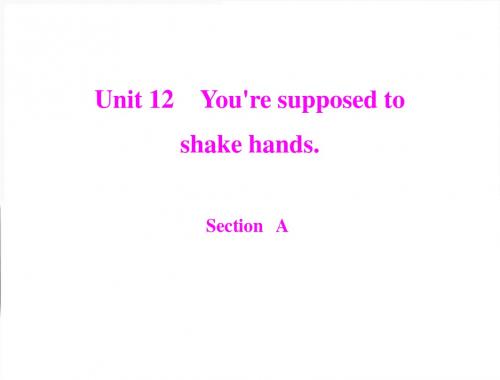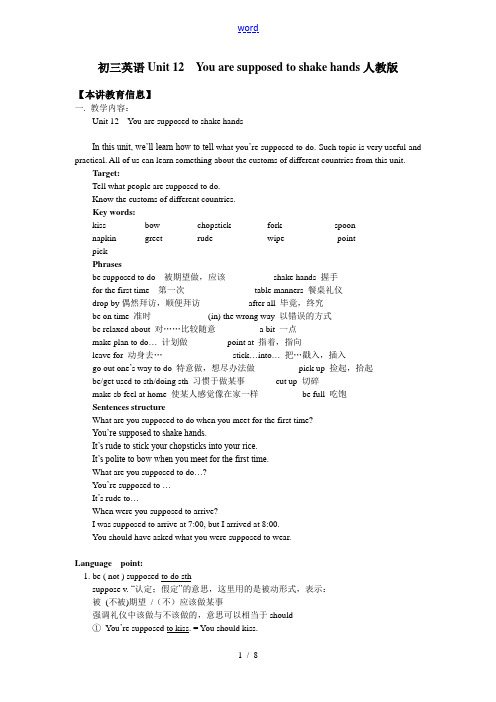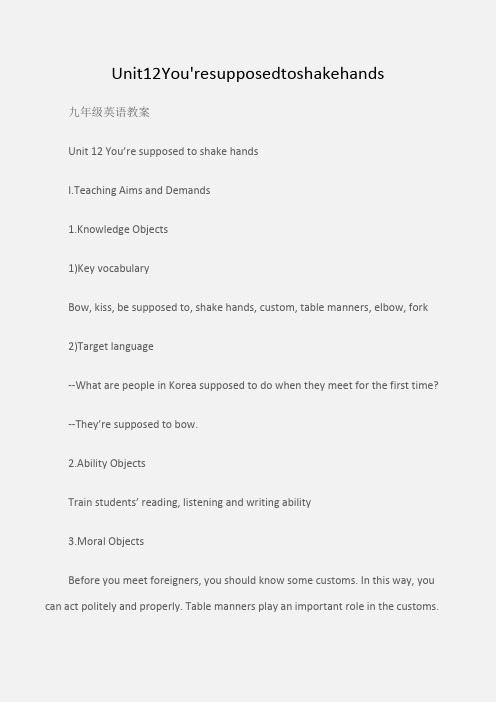【K12学习】Unit12You’resupposedtoshakehands.教学设计
Unit 12 You’re supposed to shake hands(打包3份)

3 . Often we just walk around the town center, seeing as many of our friends as we can!我们经常只是到市中心走走,同
时尽可能多地见见朋友!
(1) 本句中的 seeing as many of our friends as we can 为现在
(1)be supposed to do sth.意为“应该做某事”或“被期望做 某事”。如: You're supposed to look after your parents.
你应该照顾你的父母。
(2)for the first time 为介词短语,意为“首次;第一次”, 在句中作时间状语。如: For the first tiห้องสมุดไป่ตู้e he has to pay attention to his health. 这是第 一次他非得注意自己的健康不可。 (3)shake hands 意为“握手”,shake hands with sb.意为“与 某人握手”。如:
They shook hands with each other and then sat down. 他们握
了握手, 然后坐了下来。
①他们相互握手,然后说再见。
shook ________ hands with each other and said goodbye. They ________ ②当我们在校园遇到老师,应该向他们问好。 supposed are ________ When we meet teachers at school, we ________
①All the students walk towards the school gate, ________
初三英语Unit 12 You are supposed to shake hands人教版

初三英语Unit 12 You are supposed to shake hands人教版【本讲教育信息】一. 教学内容:Unit 12 You are supposed to shake handsIn this unit, we’ll learn how to tell what you’re supposed to do. Such topic is very useful and practical. All of us can learn something about the customs of different countries from this unit.Target:Tell what people are supposed to do.Know the customs of different countries.Key words:kiss bow chopstick fork spoonnapkin greet rude wipe pointpickPhrasesbe supposed to do 被期望做,应该shake hands 握手for the first time 第一次table manners 餐桌礼仪drop by偶然拜访,顺便拜访after all 毕竟,终究be on time 准时(in) the wrong way 以错误的方式be relaxed about 对……比较随意 a bit 一点make plan to do…计划做point at 指着,指向leave for 动身去…stick…into…把…戳入,插入go out one’s way to do 特意做,想尽办法做pick up 捡起,拾起be/get used to sth/doing sth 习惯于做某事cut up 切碎make sb feel at home 使某人感觉像在家一样be full 吃饱Sentences structureWhat are you supposed to do when you meet for the first time?You’re supposed to shake hands.It’s rude to stick your chopsticks into your rice.It’s polite to bow when you meet for the first time.What are you supposed to do…?You’re supposed to …It’s rude to…When were you supposed to arrive?I was supposed to arrive at 7:00, but I arrived at 8:00.You should have asked what you were supposed to wear.Language point:1. be ( not ) supposed to do sthsuppose v. “认定;假定”的意思,这里用的是被动形式,表示:被(不被)期望/(不)应该做某事强调礼仪中该做与不该做的,意思可以相当于should①You’re supposed to kiss. = You should kiss.②You are not supposed to smoke here. = You shouldn’t smoke here.③It is supposed to be very hot there.据说,大家认为那儿很热。
(九年级英语教案)Unit12You'resupposedtoshakehands

Unit12You'resupposedtoshakehands 九年级英语教案Unit 12 You’re supposed to shake handsI.Teaching Aims and Demands1.Knowledge Objects1)Key vocabularyBow, kiss, be supposed to, shake hands, custom, table manners, elbow, fork2)Target language--What are people in Korea supposed to do when they meet for the first time?--They’re supposed to bow.2.Ability ObjectsTrain students’ reading, listening and writing ability3.Moral ObjectsBefore you meet foreigners, you should know some customs. In this way, you can act politely and properly. Table manners play an important role in the customs.II.Teaching Key Points and Teaching Difficult Points1.Practice reading and writing using target language2.How to write an e-mail message3.Get some information about different customs in different countriesIII.Teaching AidsBlackboard, a tape recorderIV.Teaching ProceduresStep 1: Revision1.In unit 11, we learned some ways of asking for information politely. Now, if you want to go to a restroom, how can you ask?1)Do you know where I can find a restroom?2)Could you tell me how to get to the restroom?3)Would you please tell me where the restroom is?2.Discuss things that are good / bad to do in the school. Fill the blankRightCome to class on timeRaise your hands before talking。
初中英语九年级下册《Unit 12 You're supposed to shake hands》精

学案Unit 12 You’re supposed to shake hands.SectionB 3a-4一.单元整体说明:本单元主要围绕“You’re not supposed to do ”这一话题,用来学习并感知不同情境,不同文化中的礼仪,特别是餐桌礼仪。
通过了解对比不同国家的不同习俗,提升自己的文化礼仪。
二.本课学习目标:1.Enable the Ss to grasp new words and phrases2.Learn to talk about the table manners .3.Enable the Ss to know that different countries have different table manners.三.本课预习目标1.New words fork, lap, elbow etc.2. Surf and collect the table manners in France and China四.课堂建构Step1Fast reading:Task1Choose the right answer.What’s Wang Kun’s biggest challenge?A. speaking FrenchB. learning how to behave at the dinner table.Step2 Careful readingThanks for your message. I’m having a great time on my exchange program in France. It’s even better than I thought it would be . I was a bit nervous before I arrived here , but there was no reason to be. My host family is really nice .They go out of their way to make me feel at home. And you wouldn’t believe how quickly my French has improved. I’m comfortable speaking French now. Although I still make lots of mistakes, it doesn’t bother me like it used to be .Task2 Read carefully and tell true or false.1. Wang Kun is having a good time on his/her exchange program in France .2. Wang Kun’s host family go out of their way to make her feel at home.3.Wang Kun’ s French hasn’t improved and she is still afraid of speaking French.My biggest challenge is learning how to behave at the dinner table. As you can imagine, things are different from the way they are at home. For example, you are not supposed to put your bread on the plate .You are supposed to put it on the table . I thought it was pretty strange at first , but now I am used to it .You are not supposed to eat anything with your ands except bread, not even fruit! (You have to cut it up and eat it with afork.)Task3Read and chooseAs you can imagine, things are different from the way they are at home.It means :A. Things in France are not the same as the way in Wang Kun’s home.B.Wang Kun can behave at the dinner table as he can in his owncountry.Another thing is that it is very rud e to say you are full. If you don’t want any more food, you should just say ,It was delicious. Also it’s rude to put your hands in your lap .You should always keep your hands ,but not your elbows, on the table .Task4 Tell which is the correctaI have to say ,I find it difficult to remember everything ,but I am gradually getting used to things and don’t find them so strange any more. I’ll write soon and tell you more about the life in France. Hope you’re having a good school year.Task5.从文中找出It is difficult for me to remember everything.的同义句Step3 Task6Listen & Read Find out their doubts.Step4 Task7collect informationBe not supposed to do Be supposed to doput … on …put ….on …eat …with…. except bread . cut …up and eat … with…say: “”say: “”Put.. .in …Keep …on…Step5 Task9 GroupworkWhat table manners in China do you know about?Step6 Task 10 Writing :Suppose Laura from France is invited to the party a Chinese dinner party on Christmas Day .She asked you for some advice. Please writeI am happy to hear that you have a great time in Qingdao! Merry Christmas to you ! As you know things are different from the way in France. Here are some things you need to know at a Chinese party. You should …._______________________________________________________ _______________________________________________________ _______________________________________________________ _______________________________________________________ _______________________________________________________ ________________________________________________________________________________ _______________________________________________________ _______________________________________________________ ______________________________________________________________________ _____Step7 Task11 Harvest time达标检测(必做题)1、Translate the following phrases餐桌礼仪习惯于…很舒服地做某事犯很多错…特地(不怕麻烦)做某事使某人感到宾至如归7.和…不同8.有点紧张9.切碎…10.将手放在大腿上1.The knife is used for _______things.2.I used to ______afraid of the dark.3.We ___________living in the city.st night, Jim ______everyone at the party ____at home..5.My sister goes out of her way _____ help me with my English.(选做题)program in France. It’s even _____ than I thought it would be . I was a bit ______ before I arrived here , but there was no reason to be. My host family is really nice .They _____________to make me_______at home. And you wouldn’t believe how quickly my French has_______. I’m comfortable _______French now. Although I still2.I used to ______afraid of the dark.3.We ___________living in the city.st night, Jim ________everyone at theparty _______at home..5.My sister goes out of her way _______ help me with my English. Step8 Homework1.Level1.Try to retell the table manners after class.2. Level2.Wang Kun also needs to know about table manners in the USA. Please search for the information and write an e-mail to him.。
【推荐】初中英语Unit 12 You’re supposed to shake hands

【本讲教育信息】一. 教学内容:15. pick up your bowl 端起你的饭碗pick up 拣起,拾起【即学即用】My friend’s father quickly some rubbish and went outside.A. pick upB. picked upC. pick outD. picked out16. point at / to 指向17. there is no reason to do sth. 没有理由做某事18. go out of one’s way to do sth. 特地做某事19. make sb. feel at home 使某人感到不拘束20. be different from 与……不同21. make a toast 敬酒22. older people 长辈23. give compliments 称赞24. make appointments 约会25. behave differently 表现不同们来说非常重要。
(Section A, 3a)Spending time with family and friends 是动名词短语,在本句中作主语。
动名词(短语)作主语时,谓语动词要用第三人称单数形式。
如果是并列的动名词(短语)作主句时,谓语动词用复数形式。
Reading in bed is not good for your eyes. 在床上看书对你的眼睛不好。
Reading and writing take me a lot of time. 读书写作花了我不少时间。
3. We’re the land of watches, after all! 毕竟我们这里是手表王国。
(Section A, 3a)句中的land意为“国土”,“国家”。
它还可以表示“陆地”,与河流和海洋相对;也可以表示“土地”,可耕种的田地就叫做land。
Unit12 you’re supposed to shake hands. (一) 课件

·Listening
2
4
1
3
Tomorrow Steve is going to Japan to be an exchange students. His Japanese friend Satoshi is telling him about the table manners in Japan. Listen and number the pictures in the order Satoshi talks about them.
·Listening
Listen and match these sentence parts.
d 1. You aren’t supposed a. to make noise while
to…
eating noodles.
a 2. it’s polite… b 3. It’s rude… c 4. You shouldn’t…
manner 礼貌,习惯
table manners 餐桌文化 behave 行为表现
·Sentences
·Listening
Listen and match the countries and customs.
countries
1. c Brazil 2. b the United States 3. a Japan 4. b Mexico 5. a Korea
Customs
a. bow b. shake hands c. kiss
·Writing
Complete the crossword
九年级英语-Unit12_You're_supposed_to_shake_handsAlMKKM

Unit12 You’re supposed to shake handsSectionA(1a—2b)Zhashan Middle School Cheng Hong教学思路:本单元主要学习不同国家的风俗礼仪,让学生了解在不同场合下,怎样做才能表现得礼貌得体。
本节课主要学习各国初次见面不同礼仪。
本节课的目标语言是“be supposed to do …”重点学会模拟真实的语境中不同的见面礼仪。
同时在本节课训练学生的听、说、读、写能力,特别是学生的听力。
首先以一首英文歌“shake your hands”导入本单元的话题,而后通过展示各国国旗熟悉各国的英文名称,猜他们的见面礼仪,用1a部分听力检验学生的猜测。
然后用各种课堂活动表演巩固目标语言,渗透文化教学;完成2a、2b 部分的听力训练。
最后安排了一个采访活动;一个文化阅读和一个写作任务,旨在检测学生对目标语言的运用。
Teaching aims:Learn some words about customsLearn to use “be supposed to”Improve abilities of communication and improve students’listening skills.Difficulties:How to use “be supposed to”Teaching procedures :Step1 Lead--inGreet the students and listen to an English song “shake your hands”. Students guess its name. Show the language goals on the projector.Step2: Presentation:Guess game. Guess the name of countries by maps . Teach new words by imitation and act. Then guess different countries have different customs. Do listening 1a and check results.Step3: Practice:Practice “what are people supposed to do when they meet for the first time” and do Listening 1b、2b.Step4: Consolidation:1、Do an interview in 6 groups of the whole class.2、 A reading passage about cultures and answer questions3、Write about school manners using “be supposed to” or “be notsupposed to”. Maybe leave it as homework.。
九年级英语Unit 12 You’re supposed to shake hands.111

Unit 12 You’re supposed to shake hands.Section A(1a---1c)一.教学目标:学习一些见面礼仪,生活习惯,提高学生对文明生活的认识。
二.语言目标:能运用目标语言be supposed to进行对话。
三.认知目标:掌握关键词shake hands, bow, kiss ,目标语言What are people in Korea supposed to do when they meet for the first time ?They’re supposed to bow.四.情感目标:谈论“礼仪”。
尊重不同文化背景的人。
让学生知道哪些应该做,哪些不应该,养成良好的行为习惯。
五.重点:bow, kiss, shake hands, be supposed to六.难点:熟练运用目标语言进行对话。
七.教学方式:任务型教学法,情景教学,多媒体辅助教学。
八.教学设计Step 1 Warm up (Right or wrong?)T: Is it good to come to school late /eat in class /spit in public /raise your hand(s) before talking ?No, you should not come to school late . (You’re not supposed to come to school late)You should come to school early.(You’re supposed to come to school early )引出be (not) supposed to do sth.的用法。
( T: As we know, different countries have different customs. Now, look at the map )Step 2 Lead-in多媒体呈现一幅世界地图,提问学生说出一些国家的位置。
- 1、下载文档前请自行甄别文档内容的完整性,平台不提供额外的编辑、内容补充、找答案等附加服务。
- 2、"仅部分预览"的文档,不可在线预览部分如存在完整性等问题,可反馈申请退款(可完整预览的文档不适用该条件!)。
- 3、如文档侵犯您的权益,请联系客服反馈,我们会尽快为您处理(人工客服工作时间:9:00-18:30)。
Unit12You’resupposedtoshakehands.教学设计Unit12you’resupposedtoshaehands.Part1:TeachingdesignStructures:Supposedto+infinitiveTargetlanguage:HoasthedinneratPaul’shouselastnight?ell,itaso,butIadesoeistaes.Iassupposedtoarriveat7:0 0,butIarrivedat8:00.Vocabulary:iss,bo,tableanners,chopstic,for,spoon,na pin,greet,rude,ipe,point,stic,shaehands,besupposedt o,dropby,picup,youshould…Learningstrategies:paring,ListeningforeyordsSectionAGoals●TolearntousethestructureSupposedto+infinitive●Tolistenandtalabouthatpeoplearesupposedtodo ProceduresaringupbylearningaboutthestructureSupposedto+infinitiveTurntopage95first.Looatthesentences.Doyouseehothest ructureSupposedto+infinitiveisused?hatareyousupposedtodohenyoueetsoeo ne?you’resupposedtoiss.you’renotsupposedtoshaehands.henereyousupposedtoarrive?Iassupposedtoarriveat7:00.youshouldhaveasedhatyoueresupposedtoear.1aLooing,listeningandatchingHello,class.hatareesupposedtodonext?yes,youareright .earegoingtoloo,listenandatch.Noturntopage94.Looatt hepictureandlistentotherecordingforhatpeopledohenth eyeetforthefirsttie.TapescriptBoy1:hatarepeoplesupposedtodohentheyeetinyourcountry,celia?Girl1:ell,doyoueanhenfriendseetforthefirsttie?Boy1:yeah.Girl1:ell,inBrazil,friendsiss.Boy1:hataboutinexico,Rodriguez?Boy2:Inexicoeshaehands.Boy3:ebo.Girl2:Andinoreaealsobo.Boy1:ell,Iguessinostesternco untrieseshaehands.1bListeningandchecingyouaresupposedtolistenforasecondtietochecyouransers in1a.countriescustoscBrazila.bob.shaehandsc.issbtheUnitedStatesajapanbexicoaoreaNoyoucanturntopage135toreadthetapescript.hilereadingcircletheconnectivesandunderlinetheexpressions.cDoingpairorhatdopeopledohentheyeetforthefirsttie?Noinpairstelleachotherhatyounoabouteetingforthefirsttie.youareso pposedtousetheSupposedto+infinitivestructure,o?A:hatarepeopleinoreasupposedt odohentheyeetforthefirsttie?B:They’resupposedtobo.A:hatarepeopleintheUnitedStatessupposedtodohentheye etforthefirsttie?B:They’resupposedtoshaehands.A:hatarepeopleinchinasupposedtodohentheyeetforthefi rsttie?B:They’resupposedtoshaehands.A:hatarepeopleinexicosupposedtodohentheyeetforthefi rsttie?B:They’resupposedtoshaehands.A:hatarepeopleinBrazilsupposedtodohentheyeetforthef irsttie?B:They’resupposedtoiss.A:hatarepeopleinyourcitysupposedtodohentheyeetforth efirsttie?B:They’resupposedtoavetheirhands.2aListeningandchecingaria,anexchangestudentfroIndia,enttoherAericanFriendDan’splaceandhaddinnerthere.Nolistentothetapefortheistaesariaadethere.TapescriptBoy:Hi,aria.HoasPaul’sparty?Girl:oh,Dan,itasadisaster.Boy:Itas?Girl:Uh-h uh.Boy:hathappened?Girl:ell,Iassupposedtoarriveat7:00butIarrivedat8:00.Boy:oh,soyouerelate.Girl:yeah,b utinycountryit’sdifferent.henyou’reinvitedfor7:00,you’resupposedtoelater!Boy:Isee.Girl:ThenhenIetPaul’so,Iissedher.Boy:Andyoueresupposedtoshaehandsinstea d.Girl:That’sright.ANDIoreafancydress.Boy:hat’srongiththat?Girl:ell,itasabarbecue,Dan.Everyoneels easearingaT-shirtandjeans.Boy:Iguessyoushouldhaveas edhatyoueresupposedtoear.Noyouaychec√theistaesbyariaonpage95.aria’sistaes√Arrivelate;atetherongfood;√greetedPaul’sothertherongay;√oretherongclothes2bListeningandfillingTofillintheblansonpage9ouaresupposedtolistentothe tapeoneoretie.TapescriptariA:Iassupposedtoarriveat7:00butIarrivedat8:00.ari A:Inycountryit’sdifferent.henyou’reinvitedfor7:00,you’resupposedtoelater.Dan:Boy:Andyoueresupposedtoshaeh andsinstead.ariA:That’sright.AndIoreafancydress.Dan:Iguessyoushouldhaveas edhatyoueresupposedtoear.Nextyouaresupposedtoaeaconversationbasedon2b.youare supposedtosayanythingyoulie.LiHong:Iassupposedtogetupat7:00butIgotupat8:00.LiHo ng:Inyhoeit’sdifferent.henyou’reasedtogetupat7:00,you’resupposedtogetuplater.angBin:Andyoueresupposedtodotheorningexerciseinstea d.LiHong:That’sright.AndItooyschoolbacpac.angBin:Iguessyoushouldh aveasedhatyoueresupposedtotae.2cDoingpairoryouaresupposedtoroleplaytheconversationbeteenaria andDan.Andyouaresupposedtousetheinforationfroactivities2aand2b.A:HoasthedinneratPaul’shouselastnight?B:ell,itaso,butIadesoeistaes.Iassupposedtoarriveat7 :00,butIarrivedat8:00.A:hyasthat?hydidn’tyouarriveearlier?B:Butinycountryit’sdifferent.A:hatisthedifference?B:henyou’reinvitedfor7:00,you’resupposedtoelater!A:Soyoudidn’tarriveat7:00..B:henIetPaul’so,Iissedher.A:Butyoueresupposedtoshaehandsinstead. edon’tisseachotherheneareonlyfriends.B:ButIdidn’tnothatthen.A:hatdidyouear?B:Ioreafancydress.A:hat’srongiththat?B:Itasabarbecue,youno.Everyoneelseasea ringaT-shirtandjeans.A:oh,youadeanotheristae.Ithiny oushouldhaveasedhenyoueresupposedtoarriveandhatyoue resupposedtoear.3aReadingandfillingonpage96aretoexchangestudents,onefrocolobia,theothe rfroSitzerland,talingabouttheironhoeculture.Noreadt heirspeech,blacentheconnectivesandunderlinetheexpressions.TeresaLopezFrocali,colobiaarcLeBlancFroLausanne,SizerlandhereI’fro,e’reprettyrelaxedabouttie.Ifyoutellafriendyou’regoingtotheirhousefordinner,it’soayifyouarriveabitlate.Spendingtieithfailyandfrien dsisveryiportanttous.eoftenjustdropbyourfriends’hoes.edon’tusuallyhavetoaeplanstoeetourfriends.oftenejustalar oundthetoncenter,seeingasanyofourfriendsasecan!InSitzerland,it’sveryiportanttobeontie.e’rethelandofatches,afterall!Ifsoeoneinvitesyoutoeettheat4:00,youhavetobethereat 4:00.Ifyouareevenfifteeninuteslate,yourfriendaygeta ngry.Also,enevervisitafriend’shouseithoutcallingfirst.eusuallyaeplanstoseefriend s.eusuallyplantodosoethinginteresting,orgosoehereto gether.Andnoyouaresupposedtofillinthechart.Attitudeabout…colobiaSitzerlandBeingontiePrettyrelaxedabouttieveryiportanttobeontieVisitingafriend’shouseoftenjustdropbyfriends’housenevervisitafriend’shouseithoutcallingfirstaingplansithfriendsDon’tusuallyhavetoaeplanstoeetfriendsusuallyplantodosoethinginteresting,orgosoeheretoget her3bDoingpairorNextyouaresupposedtoroleplayaconversationbeteenTere saandarc,tellingaboutthedifferentattitudesoflifeint heirhoecountries.A:hatindsofrulesdotheyhaveincolobia?B:ell,theyhaveprettyrelaxedrules.A:Liehat?B:ell,it’soifyou’renotontie.A:couldyougiveeanexaple?B:Sure.Iftheytellafriendthe y’regoingtohisorherhousefordinner,it’soayiftheyarriveabitlate.A:Dotheyoftenvisitfriends’house?B:yes,theydo.Itisveryiportanttothe.Theyoftenj ustdropbytheirfriends’hoes.A:Dotheyhavetoaeplanstodothat?B:Theydon’tusuallyhavetoaeplanstoeettheirfriends.oftentheyjus talaroundthetoncenter,seeingasanyofourfriendsasethe y!B:hatindsofrulesdotheyhaveinSitzerland?A:It’sveryiportantforthetobeontie.B:Becausethey’rethelandofatches?A:aybe.Ifsoeoneinvitesyoutoeetthe at4:00,youhavetobethereat4:00.B:Ifyouareevenfifteen inuteslate,ayyourfriendgetangry?A:yes,theydo.B:Doth eyoftenvisitafriend’shouse?A:Soeties.Buttheynevergoithoutcallingfirst.T heyusuallyaeplanstoseefriends.Theyusuallyplantodoso ethinginteresting,orgosoeheretogether.DoingpairorAnexchangestudentfroEnglandisingtoyourschoolforclasses.youaresupposedtofillinthechartbeloonpage96 iththingsheissupposedtodoinsideandoutsidetheclassroo.Itesyouaresupposedto…GreetingteachersSay,“Goodorning”intheorningDoinghoeorAthoeorinschoolafterclassPhoningsoeoneSay,“NiHao,I’…”Visitingsoeone’splacecallfirst,andnocatthedooraingplansithfriendsDiscusstheplan,calltoaechangesBeingontieAlaysontieorlittleearlierGivinggiftsFestivalgiftsbeingnecessar……Noyouaresupposedtoroleplayaconversationbasedonthe chartyoujustfilledin.AconversationbeteenyouandanexchangestudentfroBritai nA:Hodoyoudo?B:Hodoyoudo?Areyouaneexchangestudent?A:yes,IafroBritain.couldtellethethingsIasupposedtod oinsideandoutsidetheclassroo?B:Sure.Togreettheteachersyousay,“Goodorning”intheorning,“Goodafternoon”intheafternoon.A:And“Goodevening”intheevening.That’sthesaeasedoinBritain.B:Forhoeoryouaydoitathoeorinschool,butalaysaftercla ss.A:canIdoitatclass?B:No,youcan’t,becauseyouhavelotstodothen.A:hatdoIhavetodoatclass?B:youillhavetositstraight,tolistenattentively,totae notes,toanserquestions,todopairor,todogroupor,todot hetestpapers,andtoreadLearningEnglish!A:LearningEnglish?AIhavetolearnEnglishhere?B:yes,youhavetolearnEnglish,too.Ifyoudon’t,youillfailtheEnglishexas.A:ButIaanativespeaerofEnglish!B:ButyouarepooratEnglishgraar!Therearelotsofgraarit esintheEnglishexa.A:ButIcanlisten,spea,readandriteinEnglish.Isthatnot enough?B:Idon’tno.Butyouhavetotaethe4th,the6thandthe8thlevelEngli shexas.A:Allright.IagreetotaeallthoseexasinEnglish,andongraar.B:Andtophonesoeoneyousaysay,“NiHao,I’…”A:“NiHao,I’…”B:Right.youarelearningfast.youaresart.A:hataboutvisitingsoeone’splace?B:callfirst,andnocatthedoor.A:hatshouldIdotoaeplansithfriends?B:Discusstheplaniththe.calltoaechangesbeforeitistoo late.A:DoIhavetobeontie?B:Itdepends.youhavetobeontieforschool.Andyoudon’thavetobeontieforealsbyyourselves.A:That’salsothesaeasedobacatBritain.A:Andgivinggifts?Ihearthatyougiveanygiftsonanyoccas ions.B:yes,edo.Butyoucan’tgivegiftstotheteachersinordertopasstheexas,andtheEnglishgraarexas!closingdonbypetingToendthisEnglishclassyouaresupposedtotaeapetition.youaresupposedtosayasanysentencesiththeStructure:Supposedto+infinitiveaspossible.Nogoaheadinpairs.Theinnerillbe givenabig,onderfulgift.。
